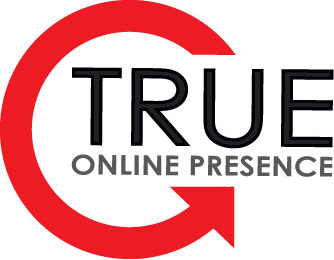Regardless of which type of advertising medium you use to run your ads, one truth is essential to your success: you must be able to track response including when, where and how potential customers responded to your ad.
For off-line advertising this may be a bit broader, such as which magazine or newspaper on which date did a customer respond to you ad. This is traditionally tracked by using a special trackable URL or trackable phone number specific for each location the ad appears.
Fortunately, for us who advertise using PPC, tracking can be pinpointed down to the exact search terms a customer used to find your ad along with a slew of other data including the exact time your ad was clicked and the device the potential customer used to click on your ad.
To access this information in Google, one must become familiar with the Search Terms report.
Growing up, I loved working with puzzles with the challenge of having all the pieces fit together to create something that sometimes could be pretty amazing if I say so myself:>
Make no mistake, Google AdWords is a on-going puzzle and the Search Terms report for advertisers who discover which search terms are leading to their ads being shown it is a big piece of unlocking the AdWords puzzle regardless of whether your campaign is a Search or a Shopping campaign.
This is where you are spending the money, so you need to know on what. Think of advertising on Google as a purchase of sort, which in fact it is as you are purchasing traffic.
You wouldn’t go to the grocery store with a list and come out with a random bag of groceries would you?
Of course not, you need specific items.
Well, you are purchasing traffic and you want to make sure you are getting specific traffic and nothing else is sneaking into your bag (back to the grocery metaphor).
By reviewing your search terms campaign regularly, an advertiser can reveal instant information about the quality of their PPC traffic.
This information can be most useful to discover the following:
- What search terms are converting.
- Which search terms are receiving traffic but are not converting.
- Whether or not search terms advertisers feel are relevant are generating traffic.
We will review why each of the reasons is important along with what to do with what you discover, but first we need to see where to access the user search terms report that shows which terms are generating traffic to your ads.
Here are the steps:
- Open any campaign or ad group (note, keywords can be viewed at the account, campaign or ad group level).
- Click on ‘Keywords’ in the left menu.
- Click on the ‘Search Terms’ link below. (For Shopping campaigns, the sub-menu under Keywords only has Negative Keywords and Search Terms. For Search campaigns, the sub-menu under Keywords contains Search Keywords, Negative Keywords, Search Terms and Auction Insights).
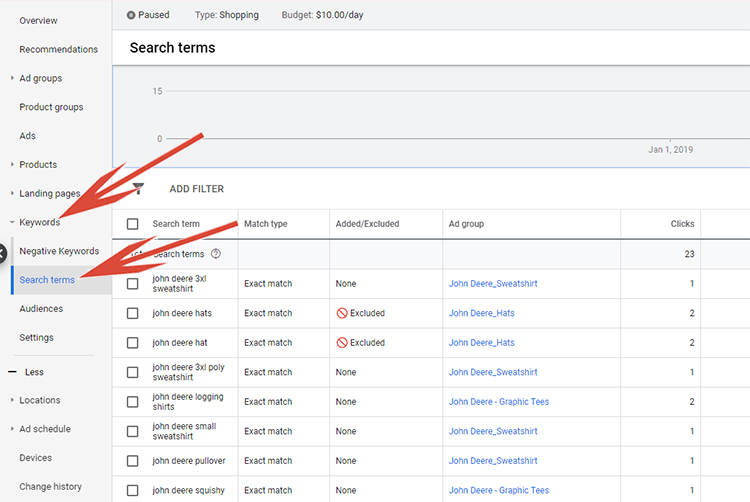
Search Terms That Are Converting – Shopping Campaigns
The way to handle search terms that are converting is going to be different depending on whether you are optimizing a Shopping campaign or a Search campaign. It is also going to depend if you are looking at the Search Terms report at the Account, Campaign or Ad Group level.
In order to be the most beneficial, especially when there are a substantial number of conversions, you are going to want to look at the most granular data possible, which means looking at the Search Terms report at the Ad Group level.
One of the most effective ways to use the Search Terms report is in discovering which keywords searches are converting and for which of your products. You can also view your click-through-rate (CTR) of any keyword searches. CTR is calculated by diving Clicks by Impressions.
If you discover a search term that has conversions; however, it has a relatively low CTR this is a great indicator that you may want to consider changing either your product title or product description.
Since only the product title, image, price and retailer name is shown in a Google Shopping ad, modifying your product title to closely relate to the search terms that have historically converted will help to improve your CTR as well to help increase your conversion rate for those keyword searches.
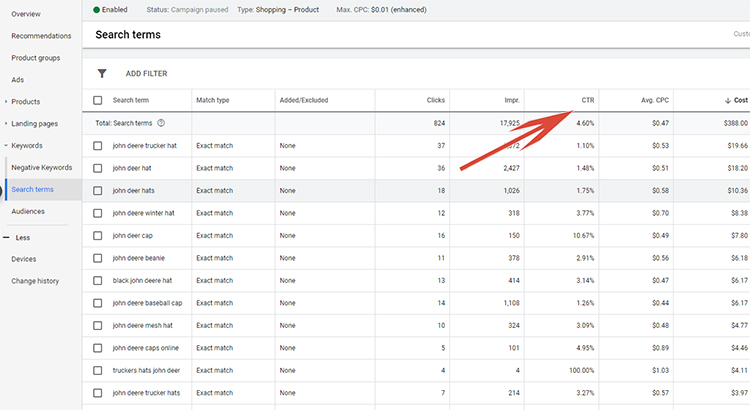
Search Terms That Are Converting – Search Campaigns
Optimizing your Search campaigns using the Search Terms report is going to be a bit different since you as the advertiser determine which keywords your products are eligible to display.
When you discover a Search Term that has converted, you will want to make sure you are advertising on that search term using your desired match type.
For a review on search term match types, review my article – Properly Using Keyword Match Type In Google Advertising.
Typically for high converting search terms, you are going to want to set your match type as an exact match type. This directs your ads to show on this search term or close variant. You can then control the bid for that exact match type within the Search Keywords tab in order to control and increase your Search Impression share.
By adding the keyword as exact match, you can also work on the quality score of your keyword. Also, if you find a keyword that is a high converting, high earner, you may consider optimizing the product name, product description or both in order to increase conversions for those high performing keywords.
In addition, you may want to review your Search ads to ensure that these high-converting keywords are included within your ads as well as possibly within your sitelinks.
Search Terms That Are Not Converting – Shopping Campaigns
With Shopping campaigns, when your products appear in searches is based on Google’s algorithm that matches your item title and description along with your bid to a customer’s search.
This can lead to many times, your product ads appearing for irrelevant terms.
By using the Search Terms report an advertiser can easily identify those terms that are spending ad budget, but not converting into sales.
Once non-converting search terms are identified, advertisers can add these search terms as negative keywords at the ad group, campaign or even account level. In addition, non-converting search terms can be added to a negative keyword list making it easier to apply across multiple campaigns.
Just like search terms, negative keywords can be added in an exact, phrase or broad match type.
For details on adding negative review my article – The Art of Adding Negative Keywords.
Search Terms That Are Not Converting – Search Campaigns
Adding negative keywords to Search campaigns is going to be very similar to adding negative keywords to Shopping campaigns.
Once you identify non-performing keywords, you can add as negative keyword as an exact, phrase or broad match at either the ad group, campaign or in a negative keyword list.
However, there is one important difference.
Since the advertiser is bidding on specific keywords, you are the one who has made your ad eligible to appear for non-relevant keyword searches.
Therefore, besides adding the negative keyword you should figure out exactly why your ad appeared for an irrelevant keyword search.
Common reasons for ads appearing for a non-relevant keyword search can include using the wrong match type. Perhaps you are using a broad match type that is bringing in too generic of traffic. You may consider either changing or adding the keyword to either an exact match or phrase match. This would allow you to lower or pause your bid on the broad match keyword thus helping to reduce the times your ads appear for non-relevant search terms.
Are Relevant Keyword Searches Generating Traffic? – Shopping Campaigns
Assuming you have done your homework and researched keywords, the Search Terms report is a great place to determine whether researched keywords are generating traffic and whether they are generating sales.
If you have identified through keyword research a keyword that historically has quite a bit of traffic on Google but is not generating traffic to your campaign, there are typically two main culprits.
First, Google does not deem your product to be relevant to that search term. In order, to remedy this issue, you will need to either change your product title, description or both to be more relevant for the keyword that you are trying to gain traffic. By making your product listings more relevant for a targeted keyword, you increase the chances of your product ads appearing for a specific search term.
Second, your bid is too low and therefore not competitive. If your product is optimized for a keyword and is still not appearing or at least not appearing often, your bid may be too low. In order to see if this is the case, you can either use Google’s bid adjuster to see what Google recommends for a bid or you can view your search impression share for a particular product ad that you believe should be receiving more traffic.
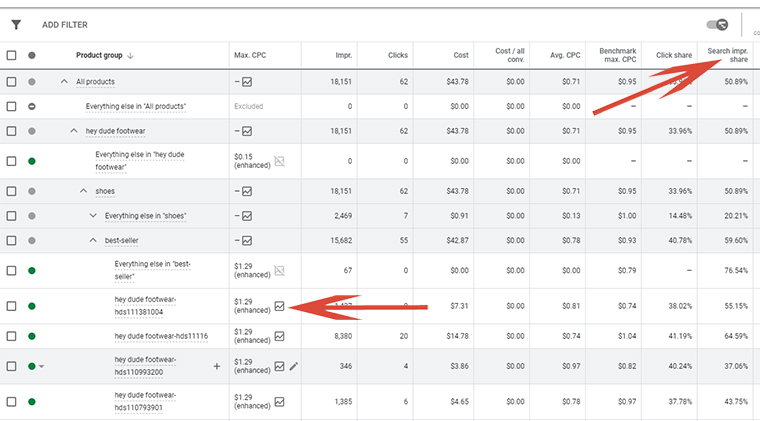
Are Relevant Keyword Searches Generating Traffic? – Search Campaigns
Remember with Search campaigns, you control the keywords where your ads appear. Therefore, if you are not appearing for a specific keyword search, there are a few reasons.
First, you are not bidding at all or you are not bidding high enough on the keyword for your ad to display for that search term. If you are looking for traffic for a specific search term, consider using an exact keyword match type. This will help your ads appear for an exact search term or slight variant without appearing generating broad traffic.
Second, if you are still not appearing for a specific search term and are using an exact keyword match type, chances are it is because your quality score for that keyword search is too low.
Advertisers can bid on any term that they wish; however, if the ad or the URL where the ad directs is not relevant to the keyword they are bidding on, then Google will not show their ads for those keyword terms.
You can view your quality score within the Search Keywords tab by adjusting your columns and adding the Quality Score. Typically, advertisers should strive for quality scores on all keywords of 7 or above. If a quality score is below 7, advertisers should consider either moving the keyword to a different campaign or ad group that is more relevant to the keyword either through the ad or the URL it is advertising; pausing the keyword; or adjusting the match type of the keyword.
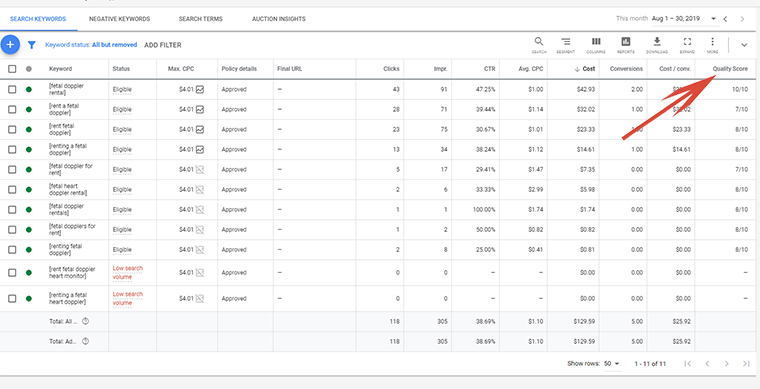
Final Word
Think of running a successful Google Campaign as a big puzzle. Trying to determine what you are spending money on; where you should increase what you are spending and where you should decrease what you are spending is a huge part of completing your puzzle.
By effectively using the Keyword Search Terms report, advertisers have a tool to complete this puzzle. However, the keyword search terms report needs to be monitored because keywords that convert can change and non-relevant keyword searches that cause ads to appear are an on-going issue within campaigns and ad groups.
The good news is that by monitoring your Search Terms report with an effective plan of action you can optimize for more profitability and effectively work to stay ahead of your competitors using Google Ads.
Looking for More Information on Google Advertising?
Check out the all new The Academy of Internet Marketing (www.theacademyofinternetmarketing.com) for exclusive video training, online courses, step-by-step instructions and exclusive access to me, author of Make Each Click Count, The TOP Guide To Success Using Google AdWords.l
If you have the dedication and are ready to take your online sales to the next level, then The Academy of Internet Marketing was created for you. It provides the tools in the form of knowledge of what works today. Join us and see what makes us special and together we will grow your business.
If you are ready to take your online advertising to the next level, I welcome you to take a trial. It only costs $1 for access.
Happy Marketing!
Andy Splichal
ABOUT THE AUTHOR

Andy Splichal is the founder of True Online Presence, the founder of The Academy of Internet Marketing, author and certified online marketing strategist with twenty plus years of experience helping companies increase their online presence and profitable revenues. To find more information on Andy Splichal, visit www.trueonlinepresence.com or read The Full Story on his blog, blog.trueonlinepresence.com.
